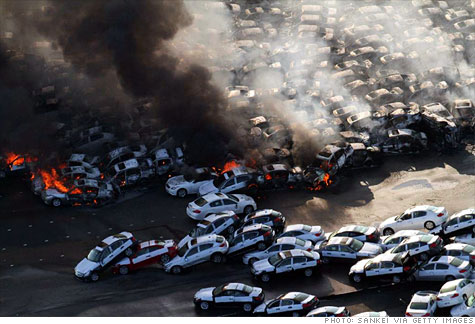Search News
 Cars waiting for export burn after March 12th's 8.9 magnitude strong earthquake in Tokai, Ibaraki, Japan.
Cars waiting for export burn after March 12th's 8.9 magnitude strong earthquake in Tokai, Ibaraki, Japan.
FORTUNE -- With its sprawling, sometimes tangled array of parts suppliers, assembly plants, logistics networks, and dealers, the auto industry is perhaps uniquely vulnerable to disasters, natural and otherwise.
Manufacturers are all too familiar with interruptions to production from floods, blizzards, land slides, and forest fires. Dealers have seen their new car inventories wiped out by overflowing rivers, surging tides, and punishing hail storms.
Catastrophes happen even at sea. A Norwegian carrier with 2,862 cars aboard sank in the English Channel in 2002 after colliding with a container ship in thick fog.
But there has been nothing like the triple threat in Japan wrought by last week's earthquake and tidal wave, combined with growing worries of a nuclear reactor meltdown.
As the world's third-largest producer of automobiles (after China and the U.S.), Japan's manufacturing network is highly developed and unusually complex. The natural constraints of Japan's crowded highways and seaports, combined with man-made complications like just-in-time parts delivery have led to the creation a finely-tuned, delicately-balanced system.
Running smoothly, it is highly productive. But a single disruption anywhere along the line can tie up the whole system. Assembling a car requires some 10,000 individual pieces, and every single one of them is needed in the finished product.
Japan has never seen a disruption like this. In addition to the direct damage caused by the earthquakes and tsunami, there are secondary effects -- coordinated power outages to deal with, supply shortages, interruption of highway, rail, and ship traffic -- and tertiary ripples. Some auto plants were reportedly closed so that employees could cope with personal issues stemming from disaster.
Japan's largest auto producers are now expected to remain shut down through Wednesday, and some analysts foresee further disruptions lasting months. "While we could see some production capacity come back on line in the next few days, energy supply limitations and parts supply restrictions make a quick return to normal operations highly unlikely," says Kurt Sanger of Deutsche Bank.
The disaster's impact has been surprisingly widespread. Mazda was thought to have been spared because it is headquartered in Hiroshima, far from most of the damage. But it suspended production at its four plants in western Japan Monday night and all day Tuesday because of parts shortages.
Demonstrating the industry's global span, repercussions are being felt as far away as Europe. Renault's operations in France are intertwined with those of its Japanese partner Nissan. Daimler's Fuso operates 2 truck plants in Japan. VW owns a 19% stake in Suzuki.
U.S. car buyers also will be feeling the effects of the disaster in coming weeks. Deutsche Bank estimates that approximately 12% of all vehicles sold in North America originate in Japan. Additionally, many vehicles produced in North America by Japanese automakers contain at least some content that is produced in Japan. The next five months are the seasonally strongest of the year for U.S. sales, so extended disruptions could cause shortages of some products.
Nissan, for instance, which makes all of its Infiniti brand cars in Japan, said the tsunami destroyed 1,300 vehicles at the Port of Hitachi plus 1,000 more at a service center, impacting exports. That will make it difficult to replenish inventories in the U.S, where only a month's supply of some Infiniti models is on the ground in the U.S.
Toyota (TM) faces a similar problem with the Prius, whose sales have spurted as gas prices have risen. The Prius is only manufactured in Japan. One U.S. dealer who is sold out of new cars told the New York Times he had resorted to displaying used models at his showroom.
Japanese manufacturers are renowned for their ability to improvise and adapt in the face of the adversity. Toyota famously resumed production within five days after a fire destroyed a brake valve supplier in 1997. Thirty-seven other suppliers improvised tooling systems and set up makeshift assembly lines to make the needed part.
The multi-faceted nature of the destruction from this disaster, however, will test all of their ingenuity and resourcefulness. ![]()






| Company | Price | Change | % Change |
|---|---|---|---|
| Ford Motor Co | 8.29 | 0.05 | 0.61% |
| Advanced Micro Devic... | 54.59 | 0.70 | 1.30% |
| Cisco Systems Inc | 47.49 | -2.44 | -4.89% |
| General Electric Co | 13.00 | -0.16 | -1.22% |
| Kraft Heinz Co | 27.84 | -2.20 | -7.32% |
| Index | Last | Change | % Change |
|---|---|---|---|
| Dow | 32,627.97 | -234.33 | -0.71% |
| Nasdaq | 13,215.24 | 99.07 | 0.76% |
| S&P 500 | 3,913.10 | -2.36 | -0.06% |
| Treasuries | 1.73 | 0.00 | 0.12% |
|
Bankrupt toy retailer tells bankruptcy court it is looking at possibly reviving the Toys 'R' Us and Babies 'R' Us brands. More |
Land O'Lakes CEO Beth Ford charts her career path, from her first job to becoming the first openly gay CEO at a Fortune 500 company in an interview with CNN's Boss Files. More |
Honda and General Motors are creating a new generation of fully autonomous vehicles. More |
In 1998, Ntsiki Biyela won a scholarship to study wine making. Now she's about to launch her own brand. More |
Whether you hedge inflation or look for a return that outpaces inflation, here's how to prepare. More |